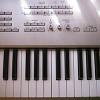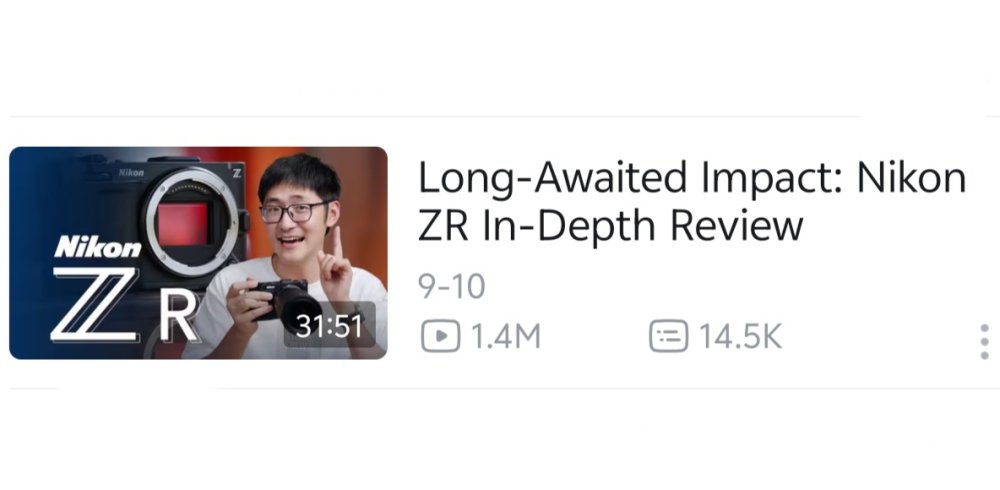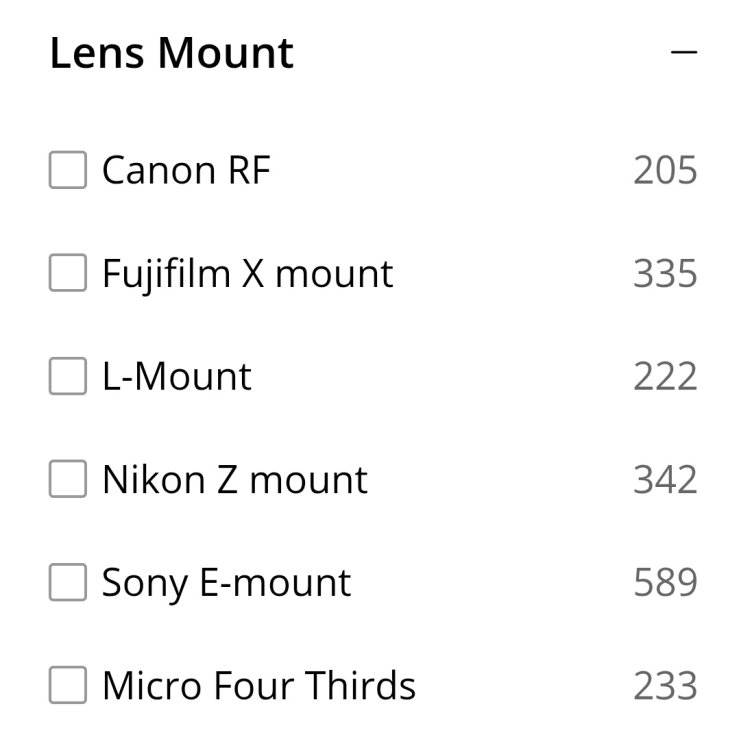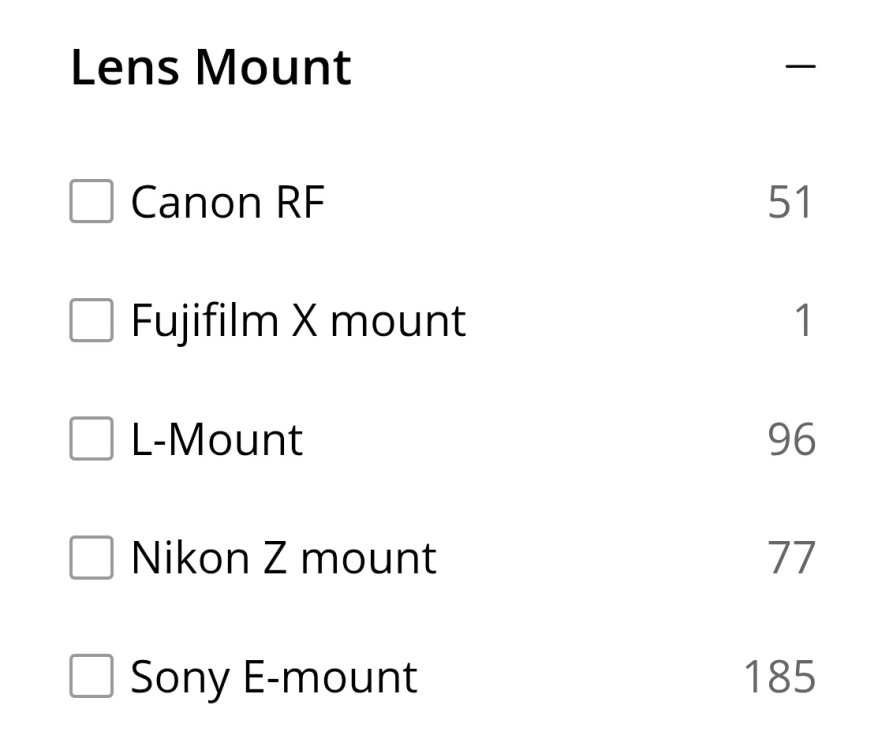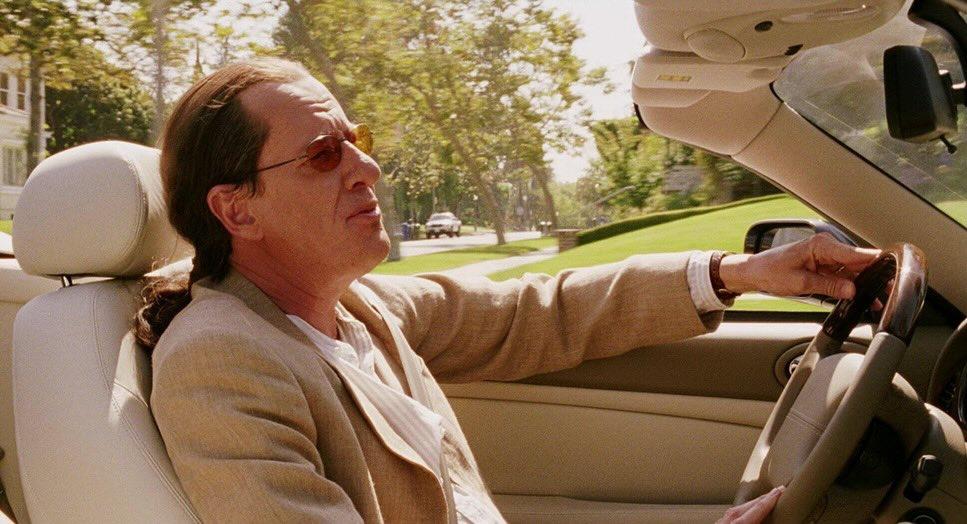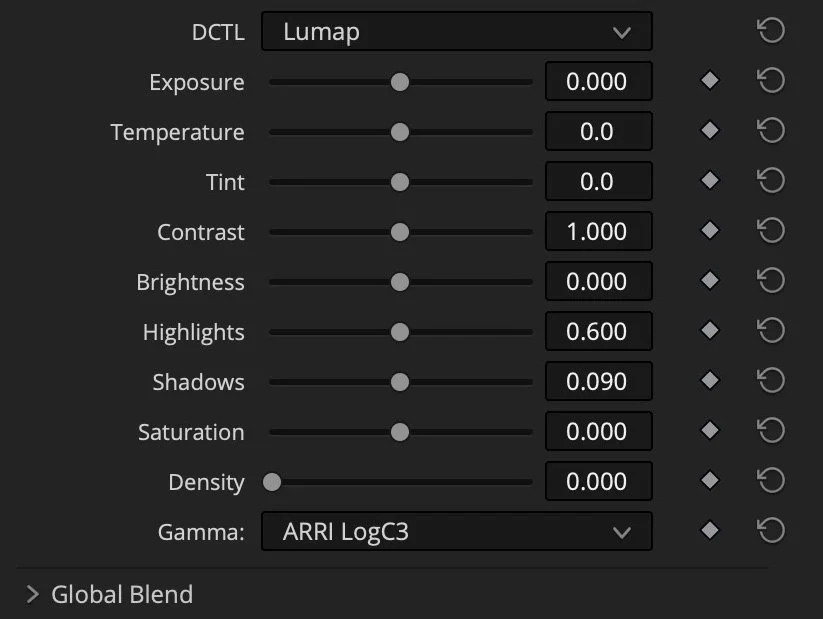All Activity
- Today
-
Yes I think Techart do but they are quite expensive at something like 400+ and I do need AF for some of what I do, but I need it to be highly accurate. The weakness of the old Lumix cameras such as the OG S5/S1H/S1R was forward tracking AF when ideally you needed a stopped down aperture, crop mode and some tweaks to the tracking to stand a chance. Since the S5II, not an issue, but even if there is an M to L Mount adapter with AF (and I have not been able to find one), I would not trust one to do this specific job above any better than the old Lumix system. The rest of the time, I don’t need AF and at 400+, might as well just have a cheap AF lens for this purpose. The Zr looks very interesting however as I always suspected it might. Enough to warrant any kind of flip, is too early to call and there is so much to consider such as… Zr stills mode vs S1RII stills mode I suspect is a win for Lumix being the sensor is 20mp larger and has a mech shutter. Video probably also the Lumix, especially as it has open gate which I shoot in all the time and Nikon does not…but probably can and maybe can in a future firmware release because it’s the same sensor as the S1II isn’t it? Red Raw ‘lite’ makes the Zr very interesting but where it gets even more and most interesting to me is I could build an even more compact kit, both bodies and lenses and tripods, than I currently have. Anyway, 6 or so months to consider and by that time there will be used Zr’s on MPB (so I could at least try one with their 14 day return policy) and Lumix may have brought a more cine-orientated camera to market than the current offerings as maybe, just maybe, they might ditch the current format for any S1H replacement…??
-
Definitely agree that lots of operations are better done in colour spaces other than the ones supported by Resolve natively. Are you using OKLab for your Lab conversion? I plan in integrating that into my tool once I get back to developing it. I'd keep all the secondary adjustments like vignetting etc as power-windows in Resolve, as getting a single vignette slider that looks good across many/all scenarios probably isn't possible. I haven't played with spatial adjustments in DCTLs yet, so I'm not sure what the performance hit is compared to OpenFX tools. I'll probably investigate this at some point though, as there are a few operations I'd do that might benefit from being integrated into a single DCTL. I played with the colour slice tool and I think it is actually very disappointing as I found it broke images incredibly quickly, while also simultaneously being too broad for lots of adjustments I'd like to make. I've had much more success in doing more targeted adjustments in Lab that didn't go anywhere near breaking the image. I find Lab is a far cleaner space to work in for lots of operations as the things you might want to do that are colour-slice-esque are often far simpler and far more universal. There are tonnes of things you can do in Lab that target certain ranges but are applied globally, so won't break the image, like how doing (most) adjustments with the Channel Mixer can't break the image.
-
Apparently it's not a great experience
-
I've seen and tried many of those other plugins and they're fantastic, which is why I wanted to take a different approach (and more affordable) with Lumap. I've found a lot of workflows in Resolve involve complex node trees meaning you're jumping across multipe nodes for basic adjustments. For instance, Mononodes has around 5 DCTLs for colour adjustments. Contour has 8 parameters for contrast. I've seen another that had over 10. What I like about Capture One/ Lightroom is that the contrast adjustment is built to just look naturally good. Paired with highlight/ shadow/ brightness sliders it gives you a lot of control, very quickly. The great thing is that for people who do want to go really deep those tools are already there.
-
I'm actually doing saturation in LAB. There's a couple of difference colour/ gamma spaces being used to get better results than you'd get from Resolve's basic tools. And great point on the UI with DCTL's as a side panel. I find resolve's ui to be designed around control panels, which most people don't have. I think adding an vignette adjustment could definitely be possible. But other power window/ brush masks might be be off using Resolve's tools on the node. You definitely should be able to use it with power windows though. I do like the idea of having those retouching tools in Resolve, but I think it might have to be done in openfx as DCTLs have limitations. Also I originally want to add something like Capture One's colour editor or a hue control, but then Resolve added the colour slice tool. And while there are better possible implementations it did feel mostly redundant.
-
 D Verco reacted to a post in a topic:
I made a DCTL that brings Lightroom-style controls to Davinci Resolve
D Verco reacted to a post in a topic:
I made a DCTL that brings Lightroom-style controls to Davinci Resolve
- Yesterday
-
I don't know about L mount. There are a few for E mount, though.
-
 eatstoomuchjam reacted to a post in a topic:
Nikon Zr is coming
eatstoomuchjam reacted to a post in a topic:
Nikon Zr is coming
-
I’m looking at M-L for my current system but that won’t happen for about 6 months or so even if I do not flip to Nikon because my season is over in less than 2 weeks so other than some play time (and nothing really compares to actual work) so too soon. I didn’t know there was an AF adapter or rather I think there is for Nikon but is there for L Mount? It would be useful but not 100% necessary. If I went Nikon, I’d go E Mount though as it would make more sense as all my glass would be adapted. I have looked at every cine lens going and based on; price, size, weight, sharpness, character, shorter than normal focus throw, close focus distance, they are a clear winner for me. I have some final manual focus tests to do with my AF Lumix lenses next job first but other than having just one camera designated to AF duty, currently my S9 with zoom, I’d prefer to go MF on my hybrids as I’m not 100% happy with the AF hit rate with pics and stickiness with video…another area where based on my experience with the Zf, Nikon is better than Lumix and it can pick out faces at something like less than 3% of the screen which is bloody good!
-
Canon USA drops new teaser (FX30 competitor?)
eatstoomuchjam replied to Ty Harper's topic in Cameras
If "improved DR" means 1/3-1/2 of a stop, I'd be inclined to not worry about that, regardless. But if the S35 mode gets a full extra stop (plus the 1/3-1/2), that's likely to be noticeable. I'd stick with the standout feature of this camera for many modern shooters being the 3:2 open gate recording option. That isn't a thing I care about so I'll continue waiting for Canon to release the camera that makes me think it'd be worth selling my R5. Hint to Canon, it probably involves the letters d, g, and o. 😅 -
I really like my Simera C's in M mount. I like my Leica M's more, but the M's are a lot less consistent. You might consider going the M mount route, if for no other reason than you can get an autofocus adapter for it - and then they'll be portable to any system that you might move to in the future.
-
The CVP test shows the C50 with a slight advantage over the R5C in the highlights (1/3-1/2 stop), but a disadvantage in the underexposure latitude, which is much noisier. On balance, this new 32mp sensor is basically equal to the R5C in the latitude test despite claims of "improved DR" at the end of the video, a claim that is never demonstrated as they don't use a Xyla chart. After all, they are retailers trying to sell you a new product! Now I'm sure someone will come along with Xyla charts and show that this camera has a DR advantage over the R5C and is closer to the R5 II. Clog-2 implementation would require that. In the meantime, I'm simply not that impressed with the C50 image or with any of the newer Canon "cinema cameras" for that matter. After the class-leading DGO sensor in the C70/C300 III, it seems that they are going backwards while the competition (e.g., Blackmagic, RED, Nikon, Fuji, Panasonic) is charging ahead . . .
-
I’m considering it myself… Seems to get a pretty long run time out of a single battery and overheating despite not having any active cooling doesn’t appear to be a problem. Perhaps I should have waited before going all in on Lumix 🤪 I still want to see what it can do for stills and would want to test it first, but a trio of these might work as I have the adapters for the Sony lenses and the Tamron zooms are the best in my experience. I’m moving towards a pair of Thypoch Simera C’s also and as these come in native E Mount, also has appeal going fully Nikon. Love the RED colour science from what I have seen and the camera itself including that rear screen is what I have always wanted and hoped Lumix might do. I still think what I have is super great, but always open to other options if they might suit me better and trimming down even further to 3 small bodies and just 4 lenses has a lot of appeal. 6-7 months to think about it and meantime, Lumix might pop out something similar and that might swing things back in favour of L Mount. Certainly not rushing into anything or blindly jumping ship but musing on options…
-
Greetings Creatives, I've created some cool new bark textures...they're 100% free to use with attribution, just like my thousands of other images, music tracks and sounds. You'll find them here: https://soundimage.org/txr-bark-seamless/ Speaking of assets, if you can, please consider making small contribution to support my efforts. I honestly hate asking, but I do pay for everything myself including my music gear which is very expensive, so contributions from the community really help me a lot. Here are some ways you can help: https://soundimage.org/donate/ https://soundimage.org/ogg-game-music-mega-pack/ https://soundimage.org/ogg-music-packs-2/ I sincerely hope some of my assets are helpful in your projects. Please feel free to share your projects if you wish...I love to see how my fellow creatives are using my work! 🙂
-
The only real drawbacks I see are the card slots being crammed in the battery door and the lack of EVF, lack of open gate. The interference between the screen and the headphone jack would be a minor drawback as well. Otherwise, it looks like an exceptional value stacked up against everything else that's out there. The 4" screen really reduces the need for an external monitor and I would like to see other manufacturers follow and the 32bit audio removes on more manual adjustment from the shooter's slate. I'd love to see these things integrated into another body with a slightly more professional build, and then I could be swayed to move over to Nikon. Maybe if the XLR adapter ends up working with the Z6 III that would be the move. It's also a little shameful that Lumix wasn't able to build a camera with this same sensor that doesn't overheat. I wonder how that came to be.
-
-
This looks like a great camera to me. Too bad the ibis isnt as great as the lumix camera's. But looks better then fx3, has a better screen, takes better stills. Never had an nikon before. So might end up buying one. The big monitor sounds like a win, as it makes so much difference in the process of enjoying making video's. External monitors are somewhat a drag.
-
 eatstoomuchjam reacted to a post in a topic:
I made a DCTL that brings Lightroom-style controls to Davinci Resolve
eatstoomuchjam reacted to a post in a topic:
I made a DCTL that brings Lightroom-style controls to Davinci Resolve
-
is there a way to control them via Streamdeck ?
-
Agree. My point is that we can see for the first time FX3 and Zr image side by side. Nikon Zr image when R3D codec is used looks good.
-
Why they're using the word "switching" so much? Why should anyone switch? You just add the camera to the rest of your gears if it works for you well. Especially with such an adaptable mount. BTW, he used BH filter to count the lenses, which is like this: But if you select only full frame lenses, and only AF ones, and exclude lens kits (like same lenses with bundled ND filter or something), you get this:
-
This is an interesting approach. The DCTL basically mimics photo editing and puts all corrections in one node. It is clearly for people who don't want to go deeper in Resolve and color correction/grading in general. They also have some or a lot of Photoshop / Lightroom experience and habits. These Resolve users do exists. I was one of them many years back and I hope your DCTL would find its users. For more sophisticated users like me now and basically anybody interested in going deeper into Resovle it is too simple and lacks fine controls. For users like me and serious colorists there are many DCTLs that address the complexity problems of split toning, S curve, better contrast, film density, etc. in Resolve. They provide much finer control over each aspect of the image. Most of those DCTLs are created by professional colorists and used by other colorist and editors. I also use some of them. Mononodes DCTLs IridescentColor DCTLs PixelTools DCTLs Many free DCTLs Cullen Kelly - Contour toolset DCTLs Waqas Qazi - Qazi's Toolkit DCTLs Behind those tools also lies a methodology well explained by colorists. For me personally understanding image editing for film and video at a deeper level is much more rewarding process. Once I created my node tree and establish each aspect of the image, editing and color correction is a piece of cake. So not for me but there are people who may like your approach.
-
the only thing i am interested is detail and dynamic range...
-
I've been working on a similar one, but in L*a*b colour space and offering a lot of more advanced tools to quickly do things I do all the time. One advantage of doing things in a DCTL rather than using the GUI controls is that when grading in Resolve while travelling etc, where you just have a small monitor and no control surfaces etc, you can make the viewer larger (IIRC using Shift-F) and it essentially gives you the viewer and the DCTL control panel on the right-hand-side of the screen, so it's a really efficient layout for grading using only the keyboard/mouse. @D Verco if you're looking for ideas on how to expand the tool I'd suggest thinking about it for use with power-windows as well as over the whole image. For example, my standard node graph has about 6 nodes with power-windows already defined that are ready to just enable if I want them. I have ones for a vignette, gradients for sky and left and right, and four large soft power windows for people where I will typically do things like brighten / add contrast / sharpen, and do basic skin operations like hue rotations / hue compressions / etc. Most of the operations I'd do with those windows are covered by your tool, but not all of them, and if a tool can be used for a range of other tasks other than just basic image processing then all the better. If you're taking a leaf from how Lightroom works, one of the most powerful features I used to use all the time (and wedding photogs would absolutely swear by) was the preset brushes. I had brushes for skin smoothing, skin brightening, under-eye, redness, etc, and of course they all used the standard Lightroom controls, but in specific combinations they really worked well. Something to think about. I'm all for people being able to charge money for their efforts, but in todays climate, the more value you can provide the easier it will be to get people to part with their (often hard-earned) money.
-
Good test and comparison with Sony FX3. https://www.youtube.com/watch?v=eCBg8Tsc7Xw
-
I think C70 will still have more latitude to play with. But honestly people are way too much obsessed with these numbers. Past 12 stop, we either digging for random shot noise, or struggle to defeat sun. This shot by Roger Deakins would be rejected by YouTubers, in their mission impossible of saving highlights:
-
Cool stuff. I look forward to trying it later this year when less busy as Lightroom is my go to for stills, but I would like to get out of Adobe in 2026. 👍
-
 MrSMW reacted to a post in a topic:
I made a DCTL that brings Lightroom-style controls to Davinci Resolve
MrSMW reacted to a post in a topic:
I made a DCTL that brings Lightroom-style controls to Davinci Resolve
-
D Verco started following I made a DCTL that brings Lightroom-style controls to Davinci Resolve
-
Hey everyone! I wanted to share something I've been working on for the past while - Lumap, a DCTL for Resolve that consolidates all your basic grading adjustments into one intuitive panel. The Problem I Was Trying to Solve I got tired of using complex node structures just to do basic exposure, contrast, and saturation adjustments that would look natural. Coming from a photography background using Capture One and Lightroom, I missed having simple sliders in one place that just worked without having to think about CSTs, colour spaces, and multiple different nodes. What Lumap Does Instead of wrestling with lift/gamma/gain wheels, Lumap gives you: Photometric exposure - Linear stops like changing exposure in-camera Temperature and Tint - For white balance Intelligent contrast - References your source’s format's middle grey without overcooking the toe/shoulder Brightness - Targets midtones while preserving highlights and shadows Organic highlight/shadow recovery - create organic, film-like roll-offs that seamlessly blend into your midtones Smart saturation - Preserves luminance and prevents skin tone oversaturation Film-style density - Control the intensity and depth of colours you get from subtractive saturation techniques Why Sliders Instead of Wheels? Most of us aren't using professional grading panels - we're using mice and trackpads. Sliders are just faster and more responsive for cursor input. Plus, if you're coming from photo editing, this interface will feel immediately familiar. There's a free demo version so you can test if it fits your workflow. https://www.dhyanverco.com/lumap Would love to hear your thoughts if you give it a try! And happy to answer any questions.




